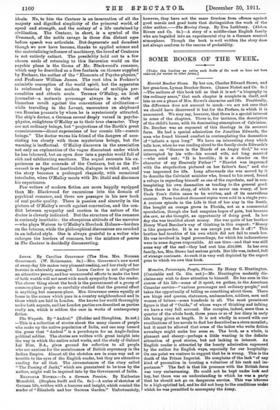SOME BOOKS OF THE WEEK.
[Under this heading we notice such nooks of the week as hare not been resereed for review in other forms.] Harriet Beecher Stowe. By her son, Charles Edward Stowe, and her grandson, Lyman Beecher Stowe. (James Nisbet and Co. 6s ) —The authors of this book tell us that it is not "a biography in the ordinary sense," that each chapter is complete in itself, and lets us see a phase of Mrs. Stowe's character and life. Practically, the difference does not amount to much—we are not sure that we should have discovered it but for the Preface, in which it is announced. We may say, however, that there is a special interest in some of the chapters. There is, for instance, the description of the child's home, with its dominating atmosphere of Calvinism. Dr. Beecher was an exponent of this theology in its severest form. He had a special admiration for Jonathan Edwards, the man who found blessed comfort in contemplating the damnation of "infants a span long." We have an interesting story which tells how, when he was reading aloud to the family circle Edwards's sermon on " Sinners in the Hands of an Angry God," he was interrupted by his wife—his second wife, not long married —who cried out : "It is horrible; it is a slander on the character of my Heavenly Father !" "Harriet was impressed with the stupefaction pictured on her father's face," and sho was impressed for life. Long afterwards she was moved by it to describe the Calvinist minister who, bound to his creed, found a refuge in regarding himself as one of the reprobate, and in con- templating his own damnation as tending to the general good. Then there is the story, of which we never can weary, of how Uncle Tom's Cabin came to be written, and of its marvellous success. Three hundred thousand copies were sold in a single year. A curious episode in the Life is that of her stay in the South. She bought an orange grove in Florida, not as a commercial speculation, though she had sanguine hopes of gain, but because she saw, as she thought, an opportunity of doing good. In her day she was troubled about money. She was quite of her brother Henry Ward Beecher's way of thinking in this respect : "Money is like gunpowder. It is no use except you fire it off !" This brother had troubles of his own which did not fail to reach her. He was involved in legal proceedings, for which his indiscretions were in some degree responsible. At one time—and that was still some way off the end—they had cost him £24,000. In her own family, too, Mrs. Stowe had serious griefs. Her life was, indeed, full of strange contrasts. As such it is very well depicted by the expert pens to which we owe this book.






































 Previous page
Previous page